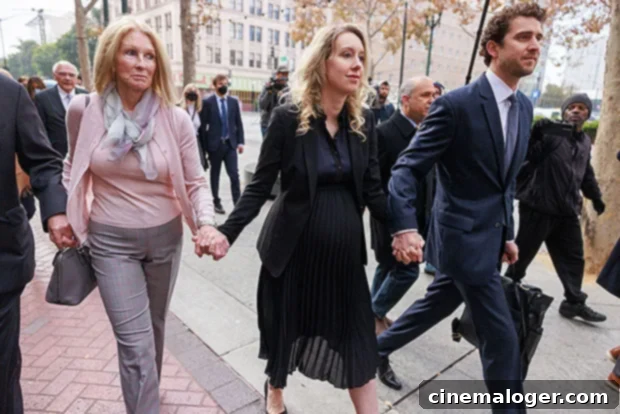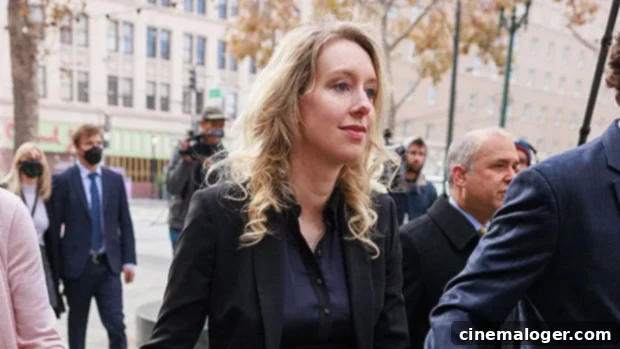Elizabeth Holmes: Expecting Second Child and Facing 11-Year Prison Sentence for Theranos Fraud
The legal saga surrounding Elizabeth Holmes, the disgraced founder of the blood-testing startup Theranos, continues to unfold with unexpected personal developments. As she prepares to begin an 11-year prison sentence for her conviction on multiple counts of fraud, court documents have confirmed that Holmes is expecting her second child. This news, initially reported by The New York Times, adds another layer of complexity to a high-profile case that has captivated public attention, especially within the tech and healthcare industries.
Holmes, once hailed as a visionary entrepreneur and the “next Steve Jobs,” was handed her significant prison term on Friday, November 18, following her conviction in January for defrauding investors through her now-defunct company, Theranos. The revelation of her second pregnancy means that the 38-year-old will likely welcome another child while incarcerated, a stark personal challenge amidst the severe legal consequences of her actions. This situation has prompted widespread discussion about the intersection of personal life and corporate accountability, as Holmes faces a future dramatically different from the one she once envisioned at the helm of a multi-billion dollar startup.

This upcoming birth marks Holmes’s second child with her partner, Billy Evans. Her first child, William Holmes Evans, was born in July 2021, a significant event that occurred just months before the commencement of her highly anticipated criminal trial. The news of her first pregnancy became public knowledge when her legal team cited the impending birth as a reason to request a delay in her trial date. This request, while standard in some legal contexts, drew considerable media attention, as it came after the trial had already faced multiple postponements, primarily due to the global COVID-19 pandemic. Observers noted that her pregnancy, whether intentionally or not, provided a temporary reprieve from the immediate legal pressures she faced, allowing her to experience early motherhood before confronting the full weight of the charges against her.
The birth of her first child, occurring amid intense scrutiny and mounting legal challenges, offered a rare glimpse into Holmes’s personal life, which had largely been kept private despite her public persona. It highlighted the duality of her existence – on one hand, a new mother navigating the joys and demands of parenthood, and on the other, a defendant facing the potential for decades in prison for corporate fraud. This personal detail underscored the human element in a story often dominated by corporate malfeasance, groundbreaking technology claims, and the cutthroat world of Silicon Valley startups.
Beyond the impending prison sentence, Elizabeth Holmes also faces substantial financial penalties stemming from her fraudulent activities. During her sentencing, she was fined $250,000 and, critically, ordered to pay restitution to the investors she defrauded. The exact amount of restitution is yet to be fully determined but is expected to be considerable, potentially totaling hundreds of millions of dollars. This financial obligation adds a complex layer to her post-prison life, as repaying such a sum will be an immense challenge, likely impacting her and her family for many years to come.
Following her release from prison, Holmes will also be subject to three years of supervised release. This period will impose strict conditions on her freedom, including monitoring by probation officers, restrictions on travel, and requirements to seek employment or educational opportunities. It signifies a continued oversight by the legal system, ensuring adherence to the terms of her sentence and a gradual reintegration into society. This extensive oversight underscores the severity of the crimes for which she was convicted, highlighting the lasting consequences of her actions.
It is a dramatic downfall for the former Stanford University dropout who, in 2003, founded Theranos with an ambitious vision to revolutionize healthcare. Under her leadership, Theranos soared to an astounding valuation of $9 billion at its peak, attracting high-profile investors and securing lucrative partnerships based on promises of a groundbreaking blood-testing technology that could run hundreds of tests from just a few drops of blood. Her journey from a celebrated innovator to a convicted felon serves as a potent cautionary tale about unchecked ambition, corporate hubris, and the devastating impact of deceit in the pursuit of success.
The meticulously crafted illusion of Theranos began to unravel in October 2015, catalyzed by a series of investigative reports published by The Wall Street Journal. These groundbreaking articles, primarily authored by John Carreyrou, meticulously detailed how the company’s vaunted technology — which promised to perform a wide array of blood tests using only a few drops from a finger-prick — was fundamentally flawed and largely non-functional. The reports revealed that Theranos was, in fact, secretly relying on commercially available, conventional blood analyzers from other companies to conduct the majority of its tests, diluting finger-prick samples to sufficient volumes for these traditional machines, which introduced significant accuracy issues and risks to patient health.
This shocking exposé contradicted years of marketing and investor pitches that painted Theranos as a revolutionary force in healthcare, poised to democratize blood testing. The Journal’s reporting raised severe doubts not only about the efficacy of Theranos’s proprietary “Edison” device but also about the integrity of its leadership. The articles highlighted a culture of secrecy, intimidation, and scientific dishonesty within the company, where concerns from whistleblowers were reportedly suppressed, and data was allegedly manipulated to deceive both investors and regulatory bodies.
The aftermath of The Wall Street Journal‘s investigation was swift and devastating. Regulatory bodies, including the Centers for Medicare & Medicaid Services (CMS), initiated investigations into Theranos’s lab practices, revealing critical deficiencies that posed immediate jeopardy to patient safety. These regulatory actions led to the voiding of thousands of test results and the eventual closure of Theranos’s labs. The Securities and Exchange Commission (SEC) also launched its own probe, ultimately culminating in federal fraud charges being filed against Elizabeth Holmes and her former romantic partner and Theranos president and chief operating officer, Sunny Balwani, in June 2018.
Sunny Balwani’s journey through the legal system mirrored Holmes’s in many respects, yet diverged in others. He faced a separate trial, where he was convicted on 12 counts of defrauding both investors and patients – a broader set of charges than Holmes’s initial conviction which focused primarily on investor fraud. Balwani’s defense attempted to portray him as a dedicated operator unaware of the full extent of the fraud, or even as being under Holmes’s sway. However, the jury ultimately found him culpable, reflecting his deep involvement in the operational aspects and alleged deception at Theranos. He is scheduled to receive his own sentencing in December, which is also expected to result in a substantial prison term, further underscoring the collective responsibility for the company’s illicit practices.
Remarkably, amidst the escalating controversy surrounding Theranos, including the damning indictment in 2018 that irrevocably sealed the company’s fate and Holmes’s legal future, she found herself embarking on a new personal chapter. In 2019, Elizabeth Holmes became engaged to and subsequently married William “Billy” Evans, the heir to the Evans Hotels empire. Their relationship began in 2017, with the couple reportedly meeting at a gathering within the vibrant, yet often insular, social circles of Silicon Valley. This relationship blossomed during a period when Holmes was under immense public and legal scrutiny, presenting a striking contrast between her crumbling professional life and her blossoming personal one.
The marriage to Billy Evans, whose family holds considerable wealth and influence in the hospitality industry, brought additional layers of public interest to Holmes’s story. While some observers questioned the timing and motivations behind the relationship given her legal predicaments, others saw it as a testament to her resilience or perhaps a desire for normalcy amidst chaos. Evans, who is reportedly close to his family, stood by Holmes throughout her trial, often attending court proceedings and providing visible support. This unwavering presence offered a different narrative to the public, showcasing a personal bond that endured despite the overwhelming legal and reputational damage surrounding Holmes.
The Theranos saga has left an indelible mark on Silicon Valley and the broader landscape of healthcare innovation. For years, the tech industry operated under a “fake it till you make it” ethos, where exaggerated claims and unproven technologies were sometimes tolerated, if not celebrated, in the pursuit of rapid growth and disruptive potential. However, Theranos exposed the dangerous limits of this philosophy, particularly in sectors like healthcare where unproven innovations can have severe, life-threatening consequences for patients.
The fallout from Theranos prompted a significant recalibration in how venture capitalists and institutional investors approach due diligence, especially for startups operating in highly regulated fields like biotechnology and medicine. There’s now a heightened emphasis on scientific validation, peer-reviewed data, and regulatory approvals rather than simply relying on charismatic founders and compelling narratives. The case serves as a stark reminder that while innovation is crucial, it must always be grounded in scientific truth and ethical conduct, particularly when dealing with public health.
As Elizabeth Holmes prepares for her incarceration, the question of how her prison sentence will impact her role as a mother, particularly with a second child on the way, looms large. Federal prisons in the United States have programs and facilities for mothers, including nurseries for infants born during incarceration, but these are typically limited and highly structured. The reality of raising young children within the confines of a correctional facility presents unique and profound challenges, both for the mother and the children.
Separation from her children, the psychological toll of imprisonment, and the inability to participate fully in their daily lives will undoubtedly be significant aspects of her sentence. While visitation may be permitted, it cannot replicate the consistent presence and care that young children require. This personal dimension of her sentencing highlights the multifaceted consequences of her actions, extending beyond legal and financial penalties to the very fabric of her family life.
Elizabeth Holmes’s story is destined to be a permanent fixture in business school case studies and a cautionary tale for aspiring entrepreneurs. Her ambition, charisma, and initial success will forever be overshadowed by the fraud she perpetrated, the investors she deceived, and the patients whose health may have been jeopardized. The public fascination with her continues, fueled by documentaries, books, and television series that delve into the meteoric rise and catastrophic fall of Theranos.
Looking ahead, Holmes faces a challenging path. After serving her time, she will emerge into a world that has moved on, though her name will forever be associated with one of Silicon Valley’s most notorious scandals. Her supervised release will mark the beginning of a long period of rebuilding, both personally and financially. The birth of her second child adds an immediate, deeply personal context to her future, ensuring that her journey through and beyond incarceration will continue to be followed, as she navigates the complex aftermath of her actions and strives to carve out a new life for herself and her family.
